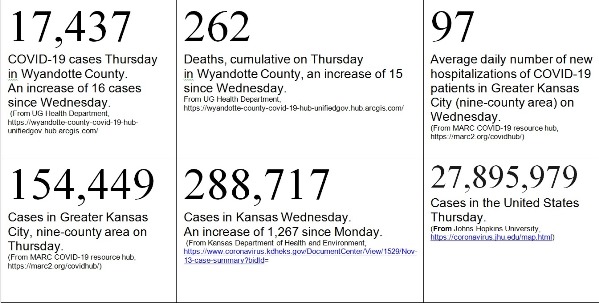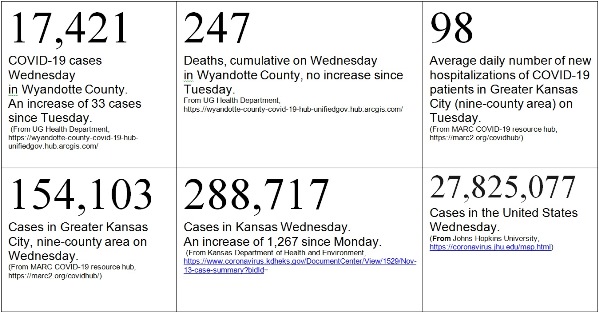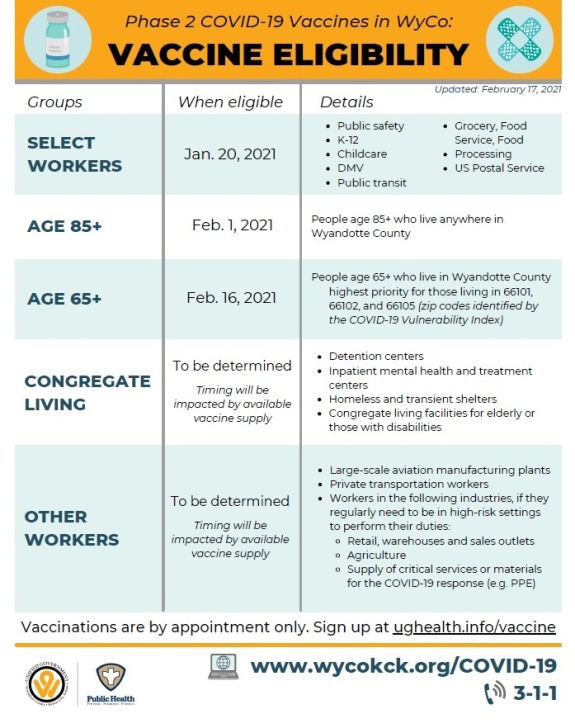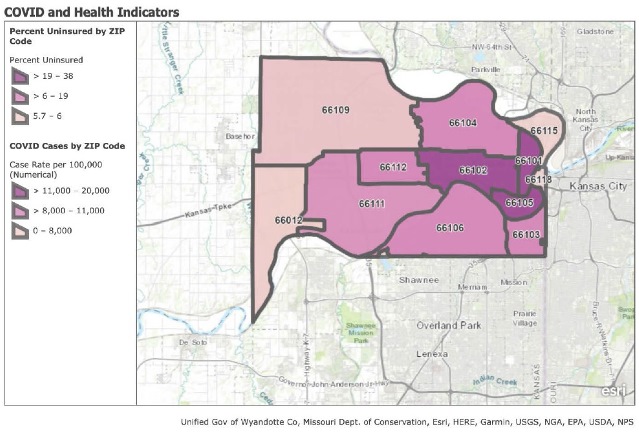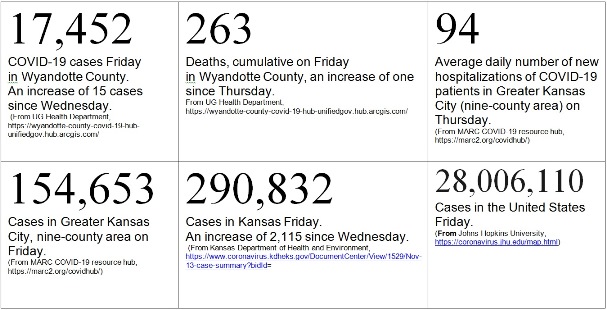
Doctors are watching new information that says a single dose of Pfizer COVID-19 vaccine could provide 80 to 85 percent protection.
“If that holds true, that may shift policy,” Dr. Steve Stites, chief medical officer at the University of Kansas Health System, said. It could be a game-changer, he added. He discussed the information at a KU Health System news conference Friday morning.
The FDA emergency use authorization for the Pfizer and Moderna vaccines requires two shots.
“We do need that vaccine supply to increase,” Dr. Dana Hawkinson, medical director of infection prevention and control, said. “If the data from the Johnson and Johnson vaccine proves efficacious and safe, that will increase the supply. We really need to get it into everybody that can get the vaccine.”
Some people are concerned because vaccines don’t stop 100 percent of the disease, he said.
“What it does do is virtually eliminate death, and significantly, almost eliminate hospitalization from those severe diseases, especially in those very vulnerable populations,” Dr. Hawkinson said.
The 80 to 85 percent protection has been published as correspondence in The Lancet medical journal, but it has not been the subject yet of a detailed study of a randomized group, Dr. Stites said. It was a comparison of more than 7,000 hospital workers in Israel, who were likely younger and more healthy than the general population, according to the doctors. There was also a letter published about it in the New England Journal of Medicine.
Dr. Hawkinson said the double-dose vs. single dose for Pfizer and Moderna will probably be a moving target, something they will see debate continuing on.
If you are getting Pfizer or Moderna now, it is recommended to get the second dose, he said, to get optimal immunity.
“For now, two shots is the way to go,” Dr. Stites said. But they want to take a close look at new information, which will spark more debate, he said.
If it is 80 to 85 percent effective, then some of the vaccine already produced for the second doses could be assigned as first doses to other people to get more people vaccinated more quickly. Then second doses might be given at a later time, as vaccine supply increases.
“I think we’re going to have to look really hard at this question,” Dr. Stites said. In the race against time, for their own health and also the race against variants, they will have to take a harder look at whether they’re better off getting one dose in, rather than two doses in, up front, knowing they have to get back to that second dose later, he said.
Right now, they are still developing the data to find the answer to it, Dr. Hawkinson said.
The number of acute COVID-19 inpatients at KU Health System has started to increase again, with 38 active inpatients on Friday, according to the doctors.
Dr. Hawkinson said he hopes it is a just a 14-day high and it will shift down a little.
Greater Kansas City case numbers and hospitalization numbers are still pretty low, according to Dr. Hawkinson.
There are still very few variants identified in the United States, and they will continue watching them, he said. The UK B-117 variant has been found the most in the United States, and its numbers are still fairly low, he said. The variant is said to spread faster and is more deadly than the original COVID-19 in the United States.
COVID-19 case numbers reported
The total number of COVID-19 active and recovering COVID-19 patients at the University of Kansas Health System was 72 on Friday, up three since Thursday, according to Dr. Dana Hawkinson, medical director of infection prevention and control. There were 38 active COVID-19 patients in the hospital, an increase of five from Thursday. Ten of those patients were in the intensive care unit, an increase of two since Thursday. Four of those were on ventilators, an increase of two since Thursday. There were another 34 patients hospitalized because of COVID-19 who were out of the acute phase, a decrease of two since Thursday.
Wyandotte County reported an increase of 15 COVID-19 cases on Friday, Feb 19, according to the Unified Government’s COVID-19 webpage. There were a cumulative 17,452 cases. There was a cumulative total of 263 deaths reported, an increase of 1 since Thursday.
The Mid-America Regional Council’s COVID-19 dashboard reported 154,653 cumulative COVID-19 cases on Friday. The daily average of new hospitalizations was 94.
The state of Kansas reported 290,832 COVID-19 cases statewide on Friday, an increase of 2,115 cases since Wednesday, according to the Kansas Department of Health and Environment. There were an additional 93 deaths reported, with a cumulative total of 4,614.
The Johns Hopkins University COVID-19 dashboard on Friday night reported 28,006,110 cases in the United States, with 495,804 total deaths nationwide.
COVID-19 tests scheduled Saturday
The Pierson Community Center COVID-19 testing site at 831 S. 55th is open at 9 a.m. Saturday, Feb. 20, according to the www.gogettested.com/Kansas website. Appointments should be made at the website.
Unified Government COVID-19 testing and vaccine sites are scheduled to be open on Monday. Those seeking vaccinations need to have an appointment, while those seeking COVID-19 testing may walk in and get a test kit.
The Unified Government Health Department’s COVID-19 test site at the former Kmart building at 78th and State will be open Monday, Feb. 22, from 9 a.m. to 3 p.m. Appointments are not needed for COVID-19 tests there on Monday. To see if there is any change to the schedule, visit https://www.facebook.com/UGHealthDept.
The Health Department is offering saliva COVID-19 tests to the public.
Tests from the Health Department are free for those who live or work in Wyandotte County.
The tests are open to asymptomatic people as well as those who have symptoms or have been exposed to COVID-19. Check with the UG Health Department’s Facebook page to see if there have been any changes in the schedule. Bring something that shows that you live or work in Wyandotte County, such as a utility bill.
Wyandotte County residents who are interested in getting a COVID-19 vaccine may fill out a survey form at the UG Health Department at https://us.openforms.com/Form/2f2bcc68-3b6a-450b-9007-d39819db6572. Residents will be contacted to make an appointment when vaccine becomes available. The Health Department currently is vaccinating high-contact critical workers, as well as residents over 65.
Testing sites are at https://wyandotte-county-covid-19-hub-unifiedgov.hub.arcgis.com/pages/what-to-do-if-you-think-you-have-covid-19.
Saliva testing is now offered at the UG Health Department. For more information, visit https://alpha.wycokck.org/files/assets/public/health/documents/covid/02042021-ugphd-saliva-testing-available.pdf.
The KU doctors’ news conference is online at https://www.facebook.com/kuhospital/videos/769421427321355.
The University of Kansas Health System COVID-19 update page is at https://www.kansashealthsystem.com/patient-visitor/covid19-update.
For more information about how Wyandotte County residents over 85 can get a vaccine at the Health Department site, visit https://alpha.wycokck.org/files/assets/public/health/documents/covid/02032021_wycovaccinationsage85.pdf.
Vaccine data for the state of Kansas is at https://www.kansasvaccine.gov/158/Data.
Cards and letters of encouragement for caregivers at KU Health System may be sent to Share Joy, care of Patient Relations, 4000 Cambridge St., Mailstop 1021, Kansas City, Kansas, 66160. Emails can be sent to [email protected].
Wyandotte County is under a mandatory mask and social distancing order.
The UG COVID-19 webpage is at https://alpha.wycokck.org/Coronavirus-COVID-19-Information.
The KDHE’s COVID-19 webpage is at https://www.coronavirus.kdheks.gov/.
The KC Region COVID-19 Hub dashboard is at https://marc2.org/covidhub/.
The Wyandotte County page on the Johns Hopkins COVID-19 website is at https://bao.arcgis.com/covid-19/jhu/county/20209.html.
The Johns Hopkins Data in Motion, a presentation on critical COVID-19 data in the past 24 hours, is at https://coronavirus.jhu.edu/covid-19-daily-video.

